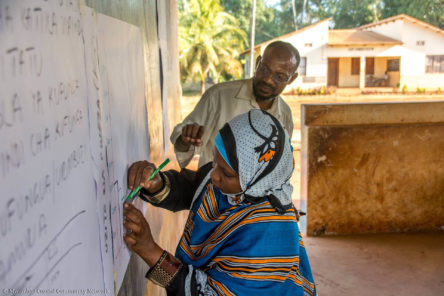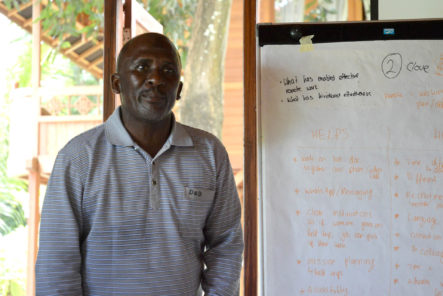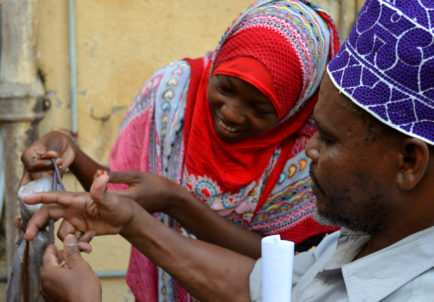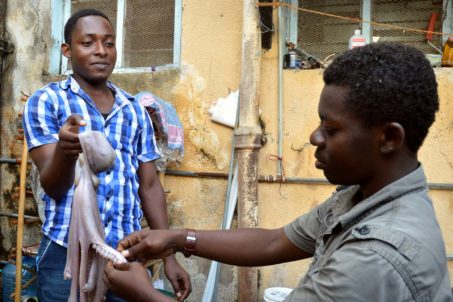The first time I sat down to interview Haji Machano, he told me a story about his first ever trip from Unguja (Zanzibar) to mainland Tanzania, some twenty years ago.
We were sailing at night, and the skipper used the stars to navigate. He told me he could pinpoint two stars and follow them until he reached a certain inlet, which would lead us through dangerous reefs, islets and sandbanks to Tanga on the Tanzanian coast. People also used the stars and landmarks to set and retrieve fishing traps, and so didn’t need to leave buoys or markers of any sort at the surface. This sort of traditional knowledge is being lost in fishing communities now.
Younger generations are not getting involved much with offshore fisheries, or if they do, they use GPS. Nonetheless, there are still some remnants of traditional systems present in most communities. No matter how eroded, every community has its culture.
Haji’s story brought to life the skills and traditions held by many coastal communities in East Africa, and illustrates how external forces are contributing to the loss of these traditions. I recently had the pleasure to interview him again, along with Khamis Juma, who are Partner Support Technicians for Blue Ventures in East Africa. Between them, they have over four decades of experience in marine management and community engagement in Zanzibar and mainland Tanzania.
Haji and Khamis are part of a larger team of Blue Ventures technicians working with local partner organisations in the western Indian Ocean and southeast Asia. Through these partnerships, coastal communities are introduced to, or encouraged to restore, locally led fisheries management and marine conservation practices. Drawing from their accumulated experiences working alongside fishing communities in the region, Haji and Khamis offer invaluable insight into the importance of working with coastal communities to manage their fisheries, and the skills needed to make it work.
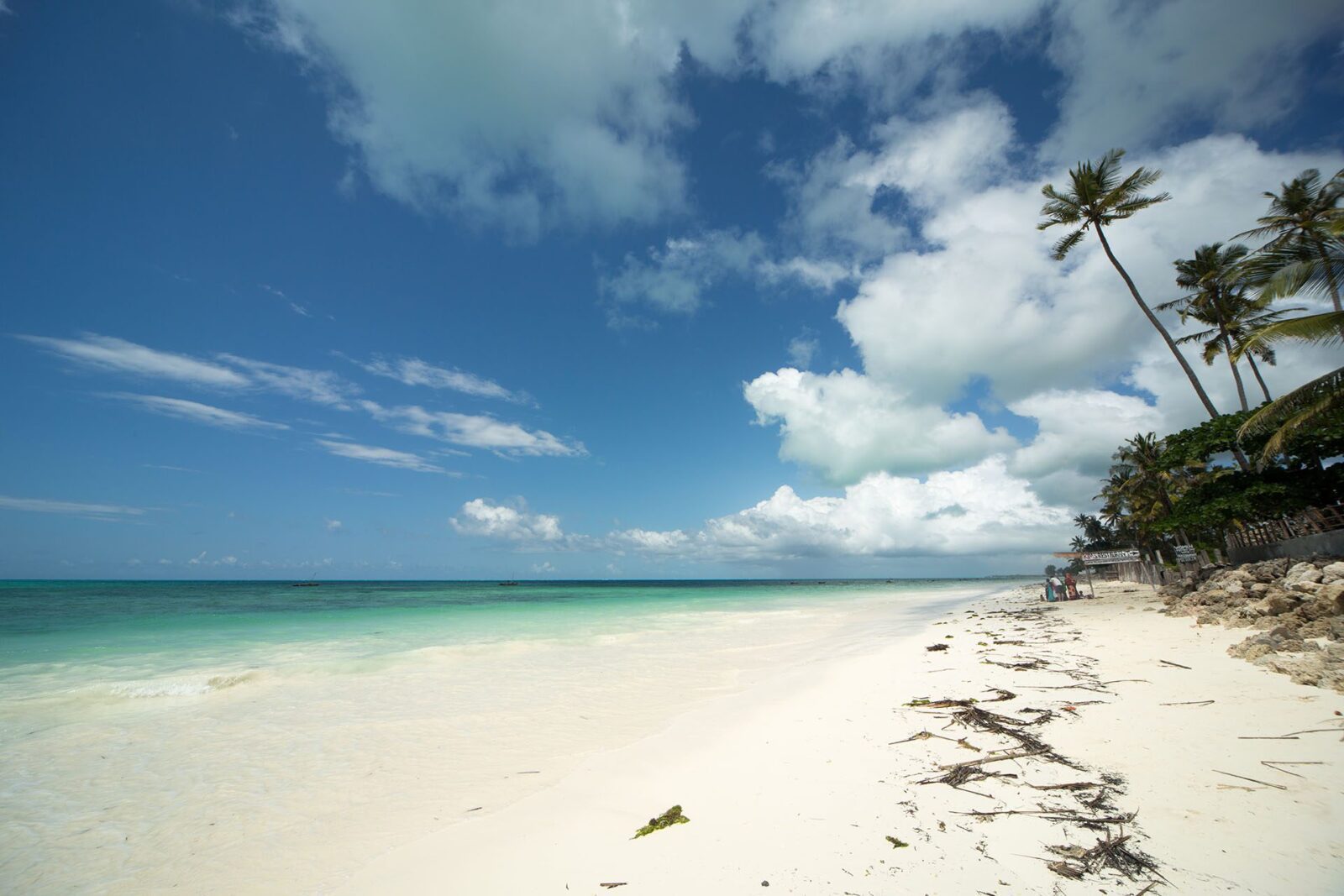
Jambiani beach, Zanzibar | Photo by Martin Muir
Haji Machano has been a Partner Support Technician for Blue Ventures in East Africa for two years. Before he joined our team, he worked with WWF Tanzania for over a decade and prior to that, he worked for the Department of the Environment in Zanzibar. Khamis Juma joined Blue Ventures in April 2018, having previously worked alongside Haji in WWF. Their current roles involve supporting Blue Ventures’ partners in Tanzania – mainly the NGOs Mwambao and marinecultures.org – as well as partners in Kenya and Mozambique.
RL: Can you tell me about the history of community-led fisheries management in Tanzania?
HM: Historically in Zanzibar, there were cultural practices regulating access to certain natural resources that were valued by the communities, along the same lines as the periodic octopus fishery closures that Blue Ventures supports. On Tumbatu Island, mangroves and coconuts were subject to periodic restrictions some thirty years ago. Community leaders implemented these restrictions, known locally as kambi, to ensure a continued supply of important materials, such as a communal source of timber that could be used in case of a house fire, for example, or to raise funds for Ramadan and other major festivals.
These practices began to wane as more formal, top-down management systems started to be implemented. These systems were not effective, but at the same time, the traditional kambi systems lost the respect required for them to work. As a result, management of natural resources started to fall apart.
RL: What are the most valuable lessons you’ve learned from your decades of experience engaging with fishing communities?
HM: I’ve learned there is no straight path. There has to be a lot of flexibility. It is really a ‘learning-by-doing’ process every time you start to work with a new community. But if you’re not willing to take a trial-and-error approach, then this community-focused co-management work is not for you!
It would be so simple if you could do your homework and learn about communities in advance, find out what the issues are, then plan your activities for developing co-management (where local communities and government work together to manage fisheries and coastal environments). In actual fact, this won’t work because communities are dynamic, everything is changing at every moment. You can start on the right foot, but then the people involved change or the relationships between the community and other stakeholders changes – so your strategy has to change too.
Communities are really diverse, and there are cultural aspects which may promote or hinder their willingness to get involved in co-management. Bringing an informal approach, where community and government interact, into the formal framework takes time and resources. It involves plenty of back-and-forth between government offices and communities, and amongst communities themselves. In an ideal world, we would have a simple programme with a beginning, middle and end, but in reality there is no such thing and there are lots of uncertainties in this process.
If you’re not willing to take a trial-and-error approach, then this community-focused co-management work is not for you!
RL: When you meet a community for the first time, what’s the first thing you talk about with them?
HM: You have to find an entry point, and usually that means asking them about the challenges they face. But by discussing those issues, you can create a heated atmosphere, which is not necessarily how you want things to start off! Nonetheless, it’s important to identify the issues people are up against. In actual fact, even if you start by discussing another topic, the community will bring you back around to what they want to discuss. If that issue is not the one you want to address then you need to find links between that and the issues you are able to help them to tackle.
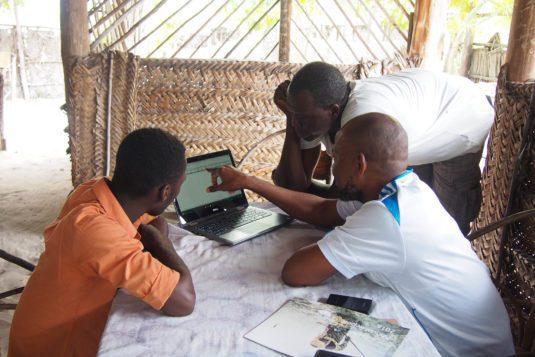
Haji training marinecultures.org staff in Zanzibar | Hannah Gilchrist, Blue Ventures
RL: I see – so you always prioritise the community’s needs in discussions, as a way to show that the co-management approach is meant to benefit them as well as the marine environment.
HM: Indeed. And whatever subject you are discussing, your attitude is more important than anything else. Sometimes, communities may start talking about issues that do not seem linked to the focus of our work, but we always take the time to listen to them. I sometimes find that the people we work alongside in coastal communities have an indirect way of speaking, but it’s important to be patient and let them get to their point.
Sometimes, the answer to a question you posed might at first seem totally irrelevant, but if you explore and dig more into that answer, you may find a meaning behind it which is really relevant and important in the bigger picture! You have to be committed to listening and learning about the social, economic and cultural aspects of their lives, to really understand the dynamics.
HM: The language we use is also very important. From one village to the next there are different names for fish species, fishing sites and so on. You have to speak the same language as the community, otherwise it’s very difficult to engage in meaningful discussions.
KJ: Communities may have a very different understanding of certain words and terms. When we were working with the Kilwa community (in mainland Tanzania), they did not like to hear the word ‘conservation’ (‘hifasi’ in Kiswahili) because they associate the word ‘conservation’ with sacrifice. But if it is expressed in a different way, for example: ‘wise use of resources so you can use them today, tomorrow, and for your children’, people are more open to continuing the conversation! We really try not to use more technical terms like ‘LMMA’ (locally managed marine area) or ‘marine park’ – they may not mean much to a community. It’s better to talk about what your end goals are, and how they will benefit the marine environment and the community.
HM: People who come from outside of these coastal communities, and perhaps have a high level of education or a government job, sometimes approach coastal communities as if they are inferior in some way. But when you are working with a community, you need to forget about your status, be humble, and attempt to learn from that community. Particularly with coastal communities, that’s the way to win their hearts. If you take your status with you to a coastal community with your status, you will leave with only your status!
If you take your status with you to a coastal community, you will leave with only your status…. You need to remove that status, be humble, and attempt to learn from that community.
RL: Over the many years you have been working with coastal communities in Tanzania and Zanzibar, what kinds of changes have you seen?
KJ: When we started using this co-management approach, the majority of people working in NGOs and government were not confident that communities would be engaged, would try new approaches and really engage with the idea of management. But what I have seen is that communities really are getting involved! They are using new technologies like smart phones to collect fisheries data. After a long investment to build capacity amongst community members, they now enforce their own management decisions, themselves; they assess their own performance and come up with ideas for addressing the challenges they face. This is positive change and real progress.
RL: What is the most challenging part of your work, and how do you deal with it?
KJ: Well, we aim to fulfil targets that we have promised to our funders, but with co-management, it’s not easy to meet those targets in short timeframes, because of the community dynamics I just mentioned. Things often take far longer than anticipated and changes in community members’ lives directly impact upon the progress of any given project.
Co-management really requires prolonged engagement with communities. We are addressing many things simultaneously – not just fisheries management but also building capacity for management within the community, addressing conflicts and above all, building trust. Until a community trusts us, we can’t understand their social and cultural contexts, their needs, and we can’t work effectively with them. In the WWF projects we worked on, it took four or five years for communities to feel like they could trust us and work with us.
RL: What motivates you to work in this field?
HM: If we want to see a movement towards co-management and towards communities acting as custodians of their marine resources, they need to be involved in every step of the process. To do that, there has to be a link between government and communities, as well as amongst communities, and that is where we come in. Without us, there’s a missing link.
RL: And why is this so important now? Why do communities need to be the custodians of their own resources?
HM: We can’t expect a better future without preparing for it and working towards it now. Climate change, increasing populations and changes in marine ecosystems – all of these are having huge impacts so it’s logical to assume that now is the best time. The longer we wait to act, the more we will have to do!
Communities have indigenous knowledge which needs to be tapped in order to scale-up fisheries management. That knowledge is very important to the management of shared resources.
Through speaking with Khamis and Haji, their respect for coastal communities and commitment to improving livelihoods and ocean health was evident, and will continue to strengthen our work throughout East Africa in years to come.
Their message is clear: the process of engaging and training communities in fisheries management is slow but effective. It requires a lot of flexibility and exchange amongst stakeholders. Those involved in the day-to-day interactions with communities would welcome more flexible funding, which acknowledges that communities are not static entities, and that the way they interact with a management project can change over time. In turn, those leading the project need the freedom to adapt planned activities and adjust timescales to achieve goals.
We now have an opportunity to merge traditional systems with the existing ‘formal’ system of management, to create a new, more inclusive approach that embraces the rich knowledge and cultures of communities, and the strengths of top-down management. This offers the potential to reinvigorate local traditions, while addressing the challenges communities in East Africa are facing. It also offers hope that, when community-based stewardship and local governance institutions join forces, coastal environments, fisheries and the people that rely on them will be able to navigate towards sustainability.


